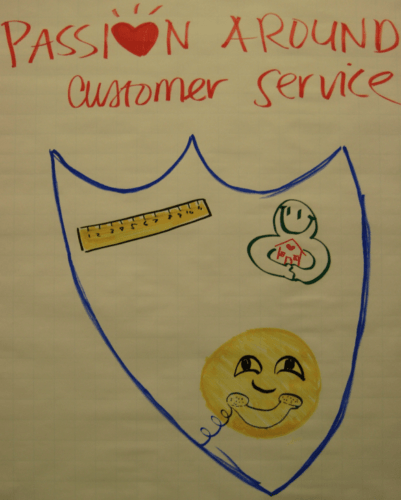The following Creativity tool stimulates the ideation activity of Brainstorming and enables people to express ideas and beliefs non-verbally, even if they cannot or will not do it orally. This is especially beneficial for developing visions of the business, system, or organization. The Creativity tool should also be used when defining, especially complex products or processes.
Creativity Tool Method

Creativity Tool Example
The Creativity tool allows each team to draw pictorial answers to a specific question or to provide solutions for a specific scenario. Additionally, the Creativity tool frequently takes less time than narrative capture. If you use the Creativity tool early during the workshop, you can mount visually stimulating wallpaper that participants will refer to later. Since teams rather than individuals generate the results, you provide timid participants permission to speak freely by enabling them to defend or explain what their teams created. Complete the following:
- Divide the group into smaller teams of three to five people. Watch the mix of people—plan how you want to mix them.
- Explain what they will be doing and provide a visual prompt of the question(s) that need to be answered. Examples:
- Draw a picture of how the organization looks today.
- Illustrate how you would like the organization or system to look in the future.
- Draw your vision of where you are going with the business or system.
- (illustrative) Provide answers to the question, “What do you expect to get out of this workshop?”
- You can use one or more of the above examples or your own. Therefore, if you have the teams draw pictures of both today and the future, you empower them with the ability to compare and contrast.
- Provide a time limit, flip chart paper, and colored markers.
- When finished, have each team present their drawing(s). Consider using the Bookend tool for identifying commonalities and items that may be extremely unique. Keep the drawings mounted on the wall and do NOT mark on them.
- Separately, capture their narrative explanations and feedback and confirm that the narrative reflections are accurate and complete.
Creativity Tool Notes
The Creativity tool is powerful in drawing out beliefs and ideas. Use it effectively by knowing how you are going to use the output.
______
Don’t ruin your career by hosting bad meetings. Sign up for a workshop or send this to someone who should. MGRUSH workshops focus on meeting design and practice. Each person practices tools, methods, and activities every day during the week. Therefore, while some call this immersion, we call it the road to building high-value facilitation skills.
Our workshops also provide a superb way to earn up to 40 SEUs from the Scrum Alliance, 40 CDUs from IIBA, 40 Continuous Learning Points (CLPs) based on Federal Acquisition Certification Continuous Professional Learning Requirements using Training and Education activities, 40 Professional Development Units (PDUs) from SAVE International, as well as 4.0 CEUs for other professions. (See workshop and Reference Manual descriptions for details.)
Want a free 10-minute break timer? Sign up for our once-monthly newsletter HERE and receive a timer along with four other of our favorite facilitation tools, free.

Terrence Metz, president of MG RUSH Facilitation Training, was just 22-years-old and working as a Sales Engineer at Honeywell when he recognized a widespread problem—most meetings were ineffective and poorly led, wasting both time and company resources. However, he also observed meetings that worked. What set them apart? A well-prepared leader who structured the session to ensure participants contributed meaningfully and achieved clear outcomes.
Throughout his career, Metz, who earned an MBA from Kellogg (Northwestern University) experienced and also trained in various facilitation techniques. In 2004, he purchased MG RUSH where he shifted his focus toward improving established meeting designs and building a curriculum that would teach others how to lead, facilitate, and structure meetings that drive results. His expertise in training world-class facilitators led to the 2020 publication of Meetings That Get Results: A Guide to Building Better Meetings, a comprehensive resource on effectively building consensus.
Grounded in the principle that “nobody is smarter than everybody,” the book details the why, what, and how of building consensus when making decisions, planning, and solving problems. Along with a Participant’s Guide and supplemental workshops, it supports learning from foundational awareness to professional certification.
Metz’s first book, Change or Die: A Business Process Improvement Manual, tackled the challenges of process optimization. His upcoming book, Catalyst: Facilitating Innovation, focuses on meetings and workshops that don’t simply end when time runs out but conclude with actionable next steps and clear assignments—ensuring progress beyond discussions and ideas.



